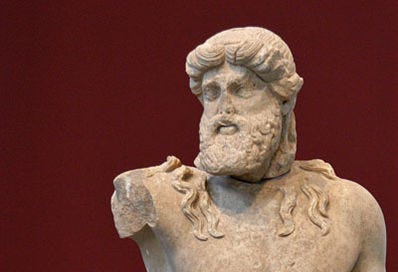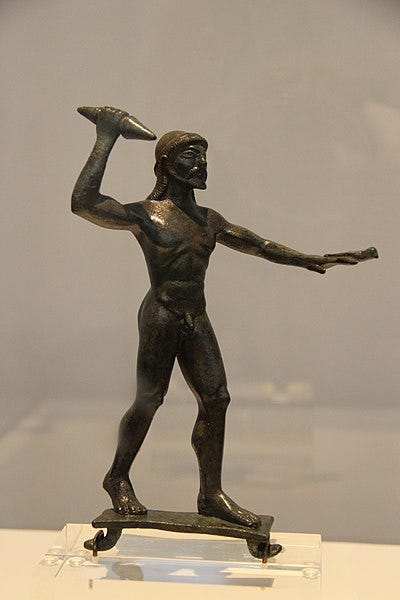This is one of a few posts dedicated to Iliad 15. As a reminder, these posts will remain free, but there is an option to be a financial supporter. All proceeds from the substack are donated to classics adjacent non-profits on a monthly basis.
“It is not possible to find medicine to bring life to the dead.”
οὐκ ἔστιν ἀποφθιμένοις ζωᾶς ἔτι φάρμακον εὑρεῖν -Ibycos
“Only Zeus has medicine for everything”
Ζεὺς πάντων αὐτὸς φάρμακα μοῦνος ἔχει -Anonymous Elegy
After Zeus wakes up from his post-coital nap at the beginning of 15, he sees right away that his plans have been subverted, and focuses in particular on Hektor. The narrator notes that he saw “Hektor lying there and his companions were /seated around him, as he struggled with a ragged breath / losing his mind a bit while he puked up blood” (15.9-12). Hektor’s health and survival is directly connected to the survival of the city and Zeus’ plans, So his wounding during book 14 and his declining situation is a clear reason for concern.
Yet, Hektor’s revival is not narrated in the same way as other. In other divine interventions (Paris rescued by Aphrodite or Aeneas rescued), the audience witnesses how a god’s agency changes the natural course of events. Even when Sarpedon nearly dies in book 5, the language of the scene is marked in such a way as to show it is remarkable. Yet, in this scene, we hear Zeus talking repeatedly about Hektor needed to be healed, only to have the action in some way skipped over.
When we next see Hektor in the middle of the book, it is alongside Apollo who “found Hektor, the glorious son of god-fearing Priam / seated–he was no longer stretched out, but he was regaining his spirit again / he recognized the companions around him, and his gasping and sweating / was relenting, since the mind of aegis-bearing Zeus was awakening him” (15.239-242).
The phrase “the mind [noos] of Zeus” does not occur frequently in Homer, but it seems to indicate either a part of Zeus’ general plan or his intention in the moment. Consider 16.103 where the narrative says that Ajax did not remain because “the mind of Zeus and the proud Trojans hurling [weapons] over came him” (16.103) or later in book 16 when the narrator laments Patroklos ignoring Achilles’ warnings and provides the proverbial sounding judgment “the mind of Zeus is always stronger than men” (688), a phrase repeated by Hektor when speaking to Glaukos in book 17 (176). Indeed, it appears that these references do seem to correlate to moments where the overall plan of Zeus is being enforced.
One of the most important parts of book 15 comes after Zeus awakens and summons Hera. As he upbraids her, he outlines the plot for the rest of the epic.
Homer, Iliad 15. 63-68
“[The Greeks] will fall among the many-benched ships of
Peleian Achilles, after they flee there. He will send out his friend
Patroklos. Shining Hektor will kill him with a spear
In ground of Troy after he has killed many other strong men
Among them will be my own son, glorious Sarpedon.
In a rage over him, glorious Achilles will kill Hektor.”φεύγοντες δ’ ἐν νηυσὶ πολυκλήϊσι πέσωσι
Πηλεΐδεω ᾿Αχιλῆος· ὃ δ’ ἀνστήσει ὃν ἑταῖρον
Πάτροκλον· τὸν δὲ κτενεῖ ἔγχεϊ φαίδιμος ῞Εκτωρ
᾿Ιλίου προπάροιθε πολέας ὀλέσαντ’ αἰζηοὺς
τοὺς ἄλλους, μετὰ δ’ υἱὸν ἐμὸν Σαρπηδόνα δῖον.
τοῦ δὲ χολωσάμενος κτενεῖ ῞Εκτορα δῖος ᾿Αχιλλεύς.
Some Alexandrian editors marked this passage as questionable (athetizing up to 20 lines of this speech). “because [the poet] needlessly repeats about the events that will immediately proceed and the verses inside are simplistic in their composition” (Schol. A ad 15.56a). Within the scholia as well, however, is the proposal that this device is “foreshadowing” (προανακεφαλαίωσις) as when “Odysseus outlines to Telemachus the murder of the suitors”.
The primary point here is that there is an overlap between Zeus’ function as a divine figure and his control over narrative devices. In the Iliad his plan is one of the most important ‘maps’ for the epic’s plot. One way to think of his speech in book 15 is as a corrective measure, pulling things back into line and pointing them back on course. From a similar perspective, if we return to the idea of the Iliad being performed in three parts, this speech is prolepsis (foreshadowing) of the type that we might see at the end of a weekly television drama: NEXT TIME, ON the Iliad….
But we also can’t lose sight of the numinous impact of his speech. Zeus’ noos–his thought about the plot–is so potent that merely be articulating the future, he sets it into action. Hektor does not need healing because as soon as Zeus has articulated what will happen next, Hektor becomes what he needs to be to serve Zeus’ plan. It is almost as if the world itself at this moment of the Iliad is a story unfolding in Zeus’ mind, a dream corrected or altered upon waking.
A short Bibliography on Zeus and Hektor in book 15
n.b this is not an exhaustive bibliography. If you’d like anything else included, please let me know.
Barker, Elton. (2022). Die Another Day: Sarpedon, Aristodemos, and Homeric Intertextuality in Herodotus.
Heiden, B. (1996). The three movements of the iliad. Greek, Roman and Byzantine Studies, 37(1), 5-22. Retrieved from https://www.proquest.com/scholarly-journals/three-movements-iliad/docview/229178418/se-2
Hunter, Richard. "39 Some Problems in the ‘Deception of Zeus’". The Layers of the Text: Collected Papers on Classical Literature 2008–2021, edited by Antonios Rengakos and Evangelos Karakasis, Berlin, Boston: De Gruyter, 2021, pp. 787-808. https://doi.org/10.1515/9783110747577-039
De Jong, Irene. 2004. Narrators and Focalizers: The Presentation of the Story in the Iliad.





